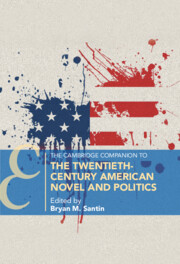Book contents
- The Cambridge Companion to the Twentieth-Century American Novel and Politics
- The Cambridge Companion to the Twentieth-Century American Novel and Politics
- Copyright page
- Dedication
- Contents
- Chronology
- Introduction
- Part I Ideologies and Movements
- Part II The Politics of Genre and Form
- Part III Case Studies
- Chapter 15 Herland (1915): Charlotte Perkins Gilman
- Chapter 16 It Can’t Happen Here (1935): Sinclair Lewis
- Chapter 17 All the King’s Men (1946): Robert Penn Warren
- Chapter 18 Invisible Man (1952): Ralph Ellison
- Chapter 19 The Left Hand of Darkness (1969): Ursula K. Le Guin
- Chapter 20 If Beale Street Could Talk (1974): James Baldwin
- Chapter 21 The Monkey Wrench Gang (1975): Edward Abbey
- Chapter 22 Ceremony (1977): Leslie Marmon Silko
- Chapter 23 Parable Series (1993, 1998): Octavia E. Butler
- Chapter 24 The Underground Railroad (2016): Colson Whitehead
- Further Reading
- Index
- Cambridge Companions To …
Chapter 15 - Herland (1915): Charlotte Perkins Gilman
from Part III - Case Studies
Published online by Cambridge University Press: 07 October 2023
- The Cambridge Companion to the Twentieth-Century American Novel and Politics
- The Cambridge Companion to the Twentieth-Century American Novel and Politics
- Copyright page
- Dedication
- Contents
- Chronology
- Introduction
- Part I Ideologies and Movements
- Part II The Politics of Genre and Form
- Part III Case Studies
- Chapter 15 Herland (1915): Charlotte Perkins Gilman
- Chapter 16 It Can’t Happen Here (1935): Sinclair Lewis
- Chapter 17 All the King’s Men (1946): Robert Penn Warren
- Chapter 18 Invisible Man (1952): Ralph Ellison
- Chapter 19 The Left Hand of Darkness (1969): Ursula K. Le Guin
- Chapter 20 If Beale Street Could Talk (1974): James Baldwin
- Chapter 21 The Monkey Wrench Gang (1975): Edward Abbey
- Chapter 22 Ceremony (1977): Leslie Marmon Silko
- Chapter 23 Parable Series (1993, 1998): Octavia E. Butler
- Chapter 24 The Underground Railroad (2016): Colson Whitehead
- Further Reading
- Index
- Cambridge Companions To …
Summary
Charlotte Perkins Gilman’s utopian fiction dramatizes her reform agenda, which turned on redressing an “unnatural” division back in human history that resulted in the excessively feminine women and humanized men who defined the norm in her own day. Her 1915 novel Herland challenges by flipping traditional gender hierarchies and roles even as it retains while naturalizing other forms of privileged status. Throughout her career, Gilman grounded her politics in the domain of biological existence, initially endorsing the view that natural laws and processes left unimpeded would inevitably work to facilitate the progressively meliorative course of evolution. But the more she became convinced that humans had deviated from this course, the more ardently she advocated for an interventionist, biopolitical approach. By the time she wrote Herland, she was diagnosing a nation’s “health and vitality” based on the extent of degeneracy and impurity she detected in the social body under examination and prescribing drastic cures as needed. Herland thus reveals the author’s conservative tendencies; these increased as she aged and soured on the prospect of sweeping social reform, but they had been there all along, even in her seemingly radical theories of gender.
Keywords
- Type
- Chapter
- Information
- Publisher: Cambridge University PressPrint publication year: 2023



